As we continue to be inundated with reality TV, we’re reminded of how much trolling culture affects reality stars after the cameras shut off.
I watch Love Island UK as religiously as a Catholic attends church on a Sunday, and it’s a welcome distraction amid all the uncertainty in the world.
However, since the latest season kicked off in late June, it has highlighted that regardless of how entertaining a reality show can be, their formats are a petri dish for casual cruelty and bullying.
**Content warning: This article discusses bullying, mental illness and suicide, and may be distressing for some readers.
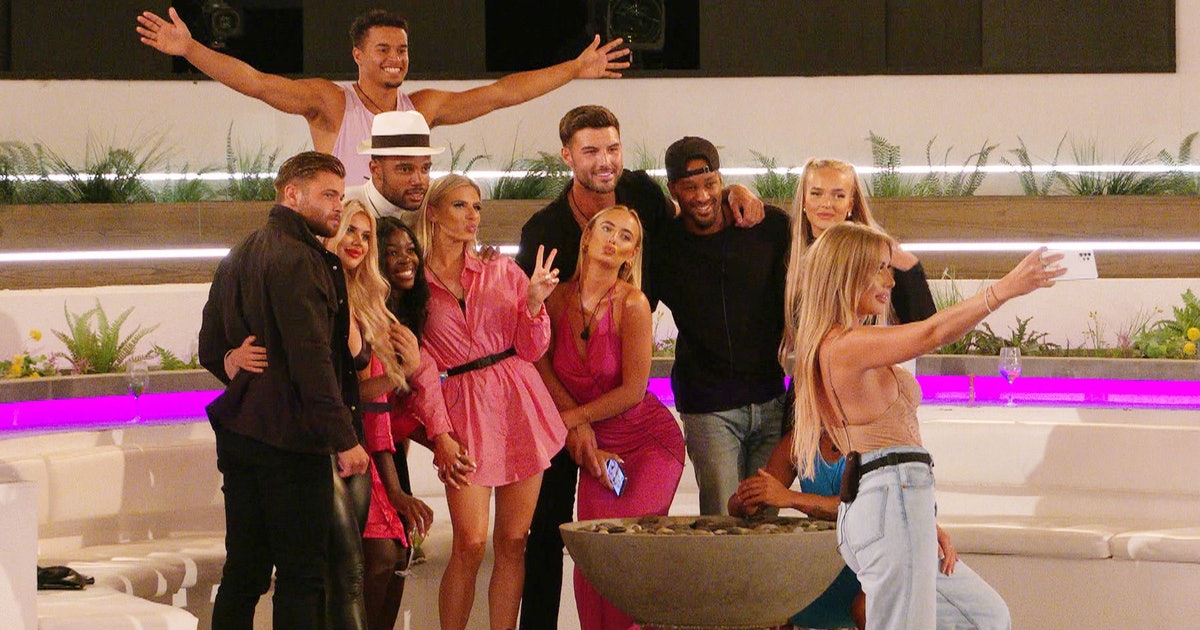
Ahead of announcing the cast of Love Island UK 2021, producers posted a much-needed reminder to their social media accounts, asking viewers to remain mindful of the contestants’ feelings. The Aussie iteration shared a similar sentiment in early October.
“We’re so grateful they’re letting us follow their journey this summer. We hope you enjoy the show, but please think before you post.”
Who’s ready for a summer full of love? 💖 #LoveIsland pic.twitter.com/oQiYPocqSE
— Love Island (@LoveIsland) June 20, 2021
The bid for kindness serves as a reminder that Love Island is plagued with the memory of past stars Sophie Gradon and Mike Thalassitis, as well as former host Caroline Flack, who all took their lives as a result of public criticism and vicious online abuse.


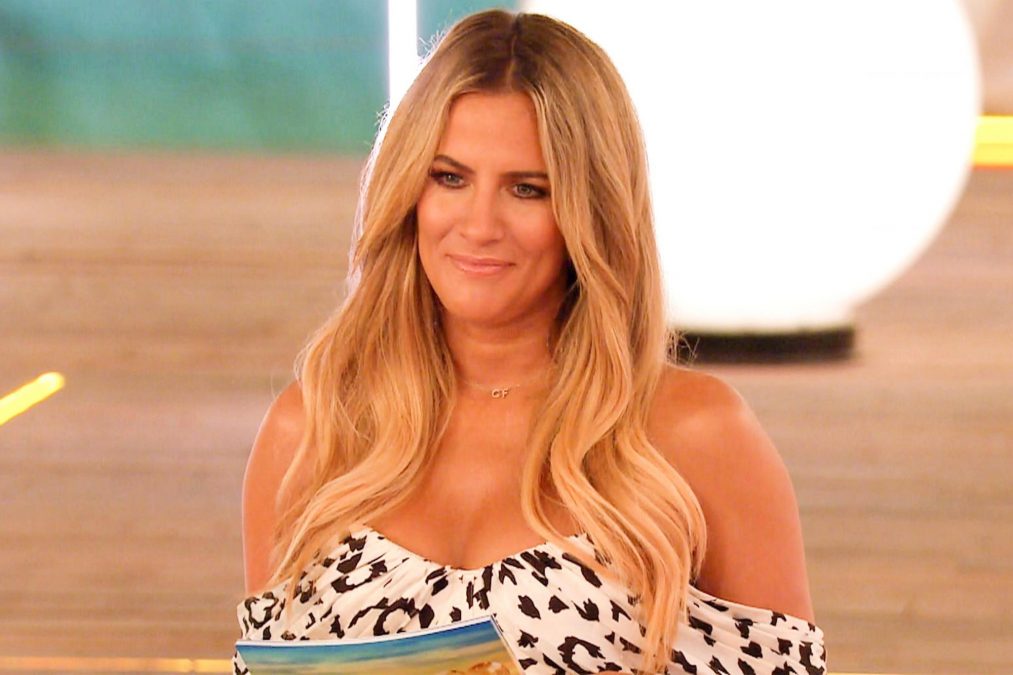
While it is reductive to pin the blame of these tragic events entirely on the series, you can’t deny that appearing on such a show opens up a wide door to the merciless world of trolling.
Its effects were felt tenfold for Sophie, who had called for internet trolls to be shamed just days before her death.
Over three years later, her Twitter bio still harrowingly reads, “Sold my soul to reality TV”.
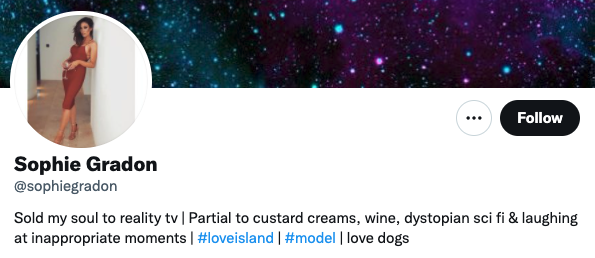
Despite Cautionary Callouts, Trolling Of Reality Stars Persisted
A UK morning show, This Morning on ITV (the channel which airs Love Island), also launched a well-publicised #BeKind Campaign in March 2021. The movement was driven by the rising rates of youth suicide as a result of bullying, across the UK.
Yet despite cautionary efforts, a number of jabs were still made at the contestants’ expense. These ranged from benign public comments about the way stars do their makeup and another’s love of “little white toes”, to traumatic private DMs urging contestants to harm themselves.
Bombshell Chloe Burrows perhaps copped the brunt of it following her arrival to the villa on the second day of the competition. She recoupled with Aaron Francis, in turn sending his previous partner Shannon Singh home after only one night on the show.
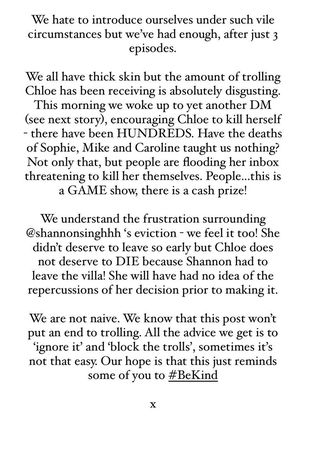
“We’ve had enough after just three episodes,” Chloe’s family, who had been monitoring her social media, wrote on an Instagram story. “We all have thick skin but the amount of trolling Chloe has been receiving is absolutely disgusting.”
The post comes after the family received “yet another DM… encouraging Chloe to kill herself”, of which they said there had been “hundreds”.
The show was forced to issue another statement, calling out viewers for their “wholly unacceptable” posts.
“We take these matters seriously and will support cast members and their families in reporting such posts,” the Love Island Instagram post read. “We would once again urge all of our viewers to think before posting and remember that our islanders have feelings.”
Similarly, The Block 2021 contestant Tanya Guccione received death threats to her home following her involvement in the show’s “biggest cheating scandal”. She was then forced to involve authorities over the vicious attacks.
The Link Between Social Media and Mental Health
Social media and mental health are definitely not mutually exclusive. In fact, the two are so inherently tethered that it’s hard to remember a time when I opened social media and didn’t feel sh*tty about myself for one reason or another — and I haven’t even appeared on a reality show.
Love Island may have made a rare feat in calling out and blocking its contestants’ trolls. However, it is easier said than done, and speaks to a much larger issue of bullying and trolling in the reality TV sphere.
In episode 68 of So Dramatic With Megan Pustetto, former Married at First Sight Australia contestant Jaimie Gardner revealed that she received countless death threats from trolls after she was portrayed as a “Bridezilla” on the show.
Jaimie received hundreds of threatening messages which were left in her inbox by producers who were handling her account.
“I got given my socials back with hundreds of troll messages left there for me to see, which I let [producers] know and their response was, obviously, ‘Sorry, this is not meant to happen’,” Jaimie said.
“They told me how to delete them or that they could… sign back in and do it for me, but I guess the damage is already done, right? Like, I’ve seen them.”
In order to combat public trolling, comments were turned off on the MAFS contestants’ social media posts before the series even went to air.
A source also revealed to So Dramatic! that the producers were to clear trolls’ direct messages from the contestants’ Instagram accounts before giving the stars access after filming.
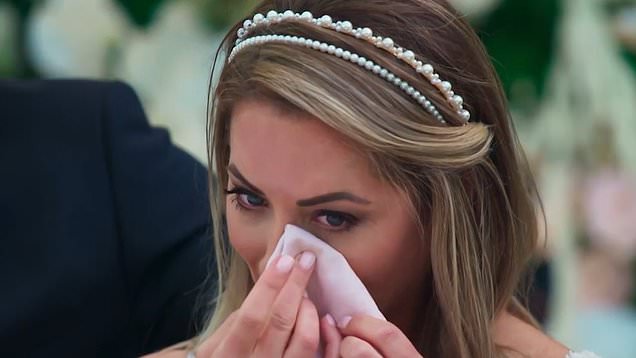
However, Jaimie claims she was the only contestant from the 2021 cast who did not have her inbox wiped, despite arguably being the most susceptible to online bullying after her appearance on the social experiment.
“I’ve had the general [trolls] that are carrying on about the trivial things and those types of comments… threats of being bashed, threats of people wanting to find you,” Jaimie said. “‘Go kill yourself’ was written a few times.”
How Much Support Do Reality Stars Receive Post-Show?
In a later interview with WHO Magazine, Jaimie said she “sought external and unbiased mental health support” to aid in her suffering of anxiety, depression and PTSD as a result of the trolling. This further begs the question: how much support is provided to contestants coming out of the reality TV pressure cooker?
Fellow MAFS alum Sarah Roza told Now To Love that while she and co-stars shared a psychologist during the experience, she believes that “support was not actually provided” after the filming period.
This is exactly when contestants need it most — particularly when they are under the full force of public scrutiny during the series’ broadcast.
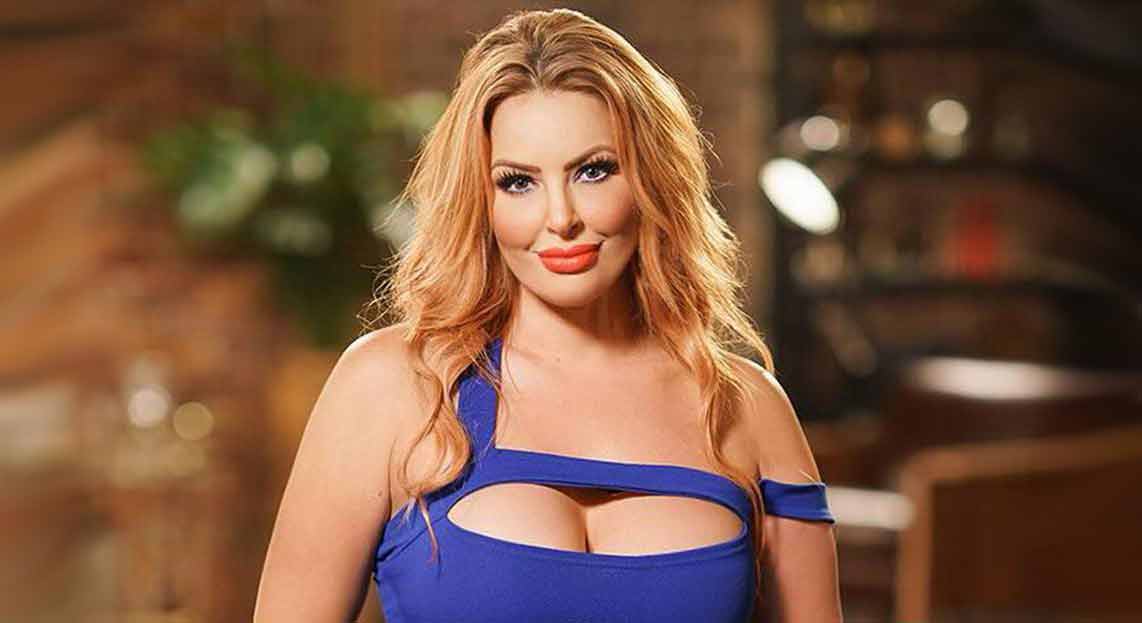
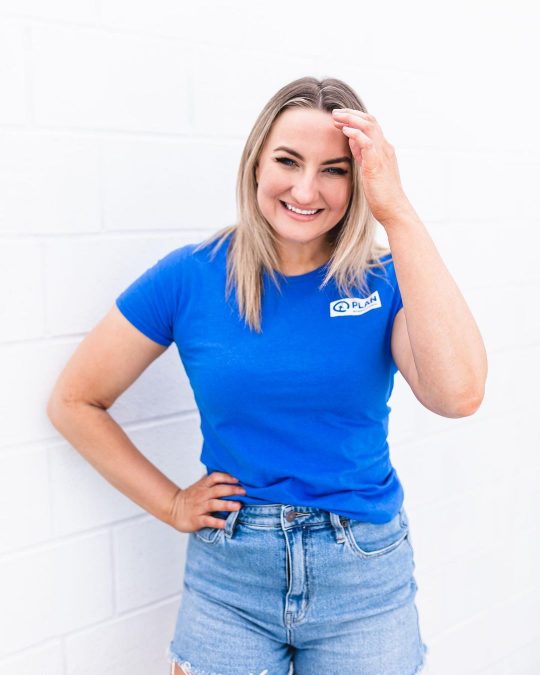
In contrast to this, Network Ten’s former reality stars cannot speak highly enough of the wellbeing support they received both during and after their experiences.
Bachelor franchise favourite Alisha Aitken-Radburn revealed in an Instagram story that she had the same psychologist during her time on the series. She also confessed that she still utilises her services post-show.
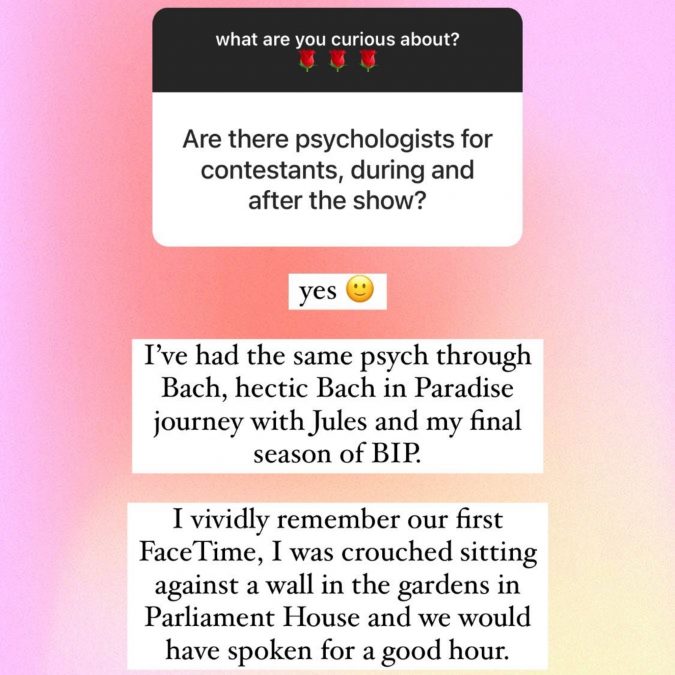
“She’s very special, beautiful and I relied on her a lot,” she wrote in response to a follower asking about Ten’s mental health support.
Bachelor franchise host Osher Günsberg previously echoed a similar sentiment, tweeting that “everyone on the show has full access to mental health professionals… before, during and after production”.
It’s probably pertinent to point out that everyone on the show has full access to mental health professionals as well as support from the Warner Bros. Australia and Network 10 teams before, during and after production. #bachelorinparadiseau
— Osher Günsberg (@oshergunsberg) July 22, 2020
The tweet came after Bachelor in Paradise contestant Jamie Doran revealed he was going to sue Network Ten and Warner Brothers for his portrayal on the series. He also cited a lack of duty of care.
It’s all good and well to post a disclaimer online that bullying will not be tolerated and contestants will be supported, but if networks really wanted to curb trolling, why not include a warning on air?
This heinous culture of poor wellbeing and trolling begins and ends with the programs these contestants appear on.
“We Are Real”
In the past, Love Island UK has featured a “Twitter Challenge”, where viewers’ controversial tweets are featured on the show but this, in turn, only rewarded the bad behaviour of trolling contestants.
Thankfully, Love Island producers scrapped the segment in the latest season.
In saying this, we also need to remember that the onus is on us too as consumers of reality television. Viewers can’t keep displaying the same casual cruelty season after season and get away with it.
Keyboard warriors seem to be of the understanding that as soon as somebody appears on reality TV, they’re stripped of their right to receive basic human decency. Yes, it’s normal to have an opinion, but making a comment to a friend is very different from putting stars on blast in a public forum with little regard for their wellbeing.
Being dehumanised as a result of appearing on television is a reality Jaimie Gardner has come to know all too well. She told So Dramatic! that she’ll “never be the same” after her Married at First Sight experience.
“People think this is just a show on TV. We are real.”
If you or anyone you know is struggling and needs support, call Kids Helpline on 1800 55 1800 or Lifeline on 13 11 14, both of which provide trained counsellors you can talk with 24/7. You can also speak with someone confidentially at Headspace by calling 1800 650 890 or chat online here. If you are in immediate danger, call 000.
Listen to more of Jaimie Gardner’s tell-all on the So Dramatic! podcast below.
Know something that we don’t? Spill the tea here!
Get the tea first! Follow So Dramatic! on Instagram, and tune in on Mondays to get your reality tea fix with the So Dramatic! podcast with Megan Pustetto.